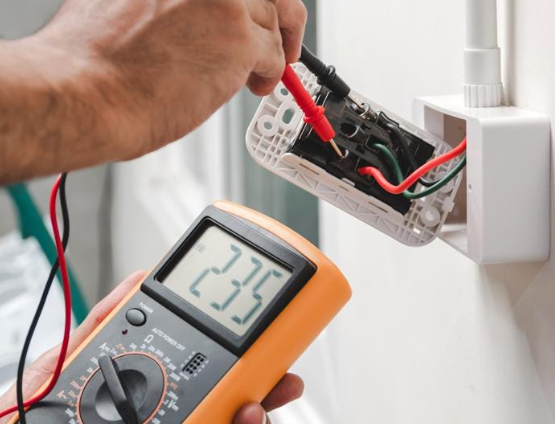Last updated on April 10th, 2023 at 09:41 pm
Does your new home need a brand new electrical wiring system? Read our complete guide to home electrical wiring.
A staggering 211,310 actual fires — that’s how many occurred in Georgia from 2013 to 2017. That puts the count at one fire occurring every 12 minutes. Cooking remains the most common cause of house fires in the state. However, many others were a result of errant electricity. Older homes are at a higher risk of electrical fires, as they may still be using the original wiring system.
If your home is one of these, it’s time to upgrade your residential electrical wiring. If you’re building a new home in Georgia, you should also learn about wiring requirements. This way, you can ensure that your installation meets building codes. More importantly, it’ll ensure that your home is safe from electrical hazards.
Ready to learn more about wiring a house? Then be sure to keep reading!
When Do You Need New Residential Electrical Wiring?
New electrical wiring installations are a must for new construction homes and extensions. Adding a detached structure, such as a garage, also require new or additional wiring.
You may also need a higher-amp circuit breaker if you’re planning a home addition. Today, the minimum circuit breaker amp rating for new homes in the US is 100 amps. Many older homes, however, only have 60-amp circuit breakers. What’s more, most modern appliances require at least a 200-amp panel.
If you’re replacing or adding new appliances, your home’s breaker may no longer be able to support them. You should consider upgrading your breaker so your electrical system can safely distribute all the electical needs.
What About Updates or Upgrades?
Existing homes may already warrant rewiring or an electrical panel replacement. This is especially true for older homes that may have outdated wiring or still use fuse boxes.
Unsure if it’s time to update your residential electrical system? Check out the list below for the signs that you need rewiring or an electrical service panel upgrade.
1. Your Home’s Construction Took Place Before 1985
Over half of all occupied homes in the US are four decades old. If your home is one of these, or if it’s built before 1985, it likely has a Federal Pacific Electric panel. These panels were a big hit in homes built between 1960 and 1985.
Either way, you should get this replaced ASAP as millions of FPE panels are defective. According to experts, these faulty electrical panels may be the reason for up to 2,800 home fires. These malfunctioning devices fail to shut off automatically even when overloaded.
2. Flickering Lights
If this happens when you turn on a high-wattage appliance, it’s a sign that you need a panel upgrade. It means that the panel can’t meet your actual electricity demands. An example is when you turn on your electric water heater or your air conditioner.
The high-wattage appliance forces it to draw in more power than its capacity. As a result, it tries to compensate by temporarily shutting the supply to your lights first. In this case, have a licensed electrician perform an electrical inspection ASAP. This way, you can determine if your flickering lights are a result of an undersized panel. If so, then it’s best that you get your home’s electrical system upgraded.
3. An Increase In Circuit Breaker Trips
It’s a must for a circuit breaker to trip whenever it overloads. It’s a safety design that prevents excessive current from flooding your wires. If it trips often though, it means your electrical panel can no longer meet your energy demands.
Do Electrical Wiring Jobs Require an Electrical Permit?
In Georgia, an electrical permit is a requirement for all new constructions. You also need to secure this permit if you plan to make electrical changes to an existing home.
You need to get this permit before you can even change or install new electrical wiring and devices. The same goes when running extra electrical wires, getting a new outlet, or setting up a new light fixture. Replacing fuse boxes to circuit breakers also requires this permit.
Who Can Do the Electrical Work?
Because of the hazardous nature of electrical work, it’s best to leave the job in the hands of pros. Besides, only a licensed electrician can perform electrical services in the Peach State. Depending on the scope of work, this can either be a I or Class II license.
Schedule One Of Our Licensed Electricians Today!
Electrical Wiring in the Kitchen

In 2011, 64% of US households owned at least six appliances and electronics goods. These include a refrigerator, dishwasher, and stove among others.
Experts project this number of owned appliances to rise over the years. In fact, they project the value of the US household appliances market to reach $59.76 billion by 2025.
That said, there’s no doubt that the kitchen is the biggest electricity user in all US homes. Today, new kitchens need a minimum of seven circuits just for the standard appliances.
Here are other things to keep in mind when wiring or rewiring your kitchen.
Dedicated Circuits
Certain appliances such as an electric range, dishwashers, and washing machines need their own dedicated circuit to ensure safe and efficient operation. A dedicated circuit is a single outlet that is dedicated to one specific appliance. Large modern appliances require a lot of power and a dedicated electric circuit provides the full power that they need while reducing the risk of a system overload which can lead to an electrical fire.
If you need a dedicated circuit for any room in your house or business in the metro Atlanta area, call the electricians at ServiceWise Electric today at 404-704-4903 to schedule an estimate.
GFCI Protection
Every year, the US sees at least 30,000 injuries as a result of shock incidents. Electrical injuries also cause an estimated 5% of burn unit hospitalizations. This is why ground-fault circuit-interrupters (GFCIs) are now mandatory in the US. GFCIs are devices placed on electrical outlets to prevent such electrical shocks. These are also found in circuit breakers and extension cords.
The job of GCFIs is to monitor electrical current imbalances. They then automatically shut the power off when such imbalances occur. The speed in which they turn the power off helps reduce the effects of errant current on human tissues.
Wiring Your Bathroom
Since water is always present in bathrooms, all receptacles should have GFCI protection. The number of circuits you need to wire to your bathroom depends on the appliances you use. If you have a vent fan with a built-in heater, you need a dedicated circuit for this.
Living Room Wiring Requirements
Although not as power-hungry as the kitchen, a living room can still use a modest amount of energy. Especially if you have a complete and high-wattage entertainment system. At the very least, you should have a standard 120-volt 15- or 20-amp circuit for the living area. There should also be a wall receptacle for every 12 feet of a wall area. A single section of a wall that’s wider than 2 feet should also have at least one outlet.
Electrical Wiring for the Dining Room

If you have a high-wattage appliance in the dining area, it may need a dedicated circuit. An example is a microwave, which may need its own 20-amp circuit. Wall receptacle requirements are the same as with the living room.
Bedroom Wiring
Wall outlet requirements for the bedroom are similar to those for your living room. However, you need a separate circuit for a room or window air conditioner.
Electrical Lighting Requirements
As for lighting requirements, 75% of permanent light fixtures should be high-efficiency lamps. For a new home, consider going full-on 100% so you can get the most energy efficiency. If you have an older home, however, be sure that your current set-up can accommodate modern lights.
Also, if you plan to upgrade recessed lighting systems, consider going with LED lights. LED lights convert as much as 90% of the energy they use into light. Incandescent lights, on the other hand, only convert 10% of the energy they draw. Despite their brightness, LEDs still use 80% less energy than incandescent lights. They also consume 40% less energy than fluorescent lighting. To top it off, LED lights have a whopping 50,000-hour life span.
Keep in mind that there should also be a light switch right beside each room’s door. This is a requirement to ensure proper visibility whenever entering a room. The switch can either be for a ceiling or wall light.
Make Sure Your Home’s Electrical Wiring is Safe
There you have it, your ultimate guide on residential electrical wiring requirements. Now that you know the basics, be sure that your home’s electrical system meets building codes! It’s for your own safety and precaution, as even the smallest electrical spark can already lead to a fire.









